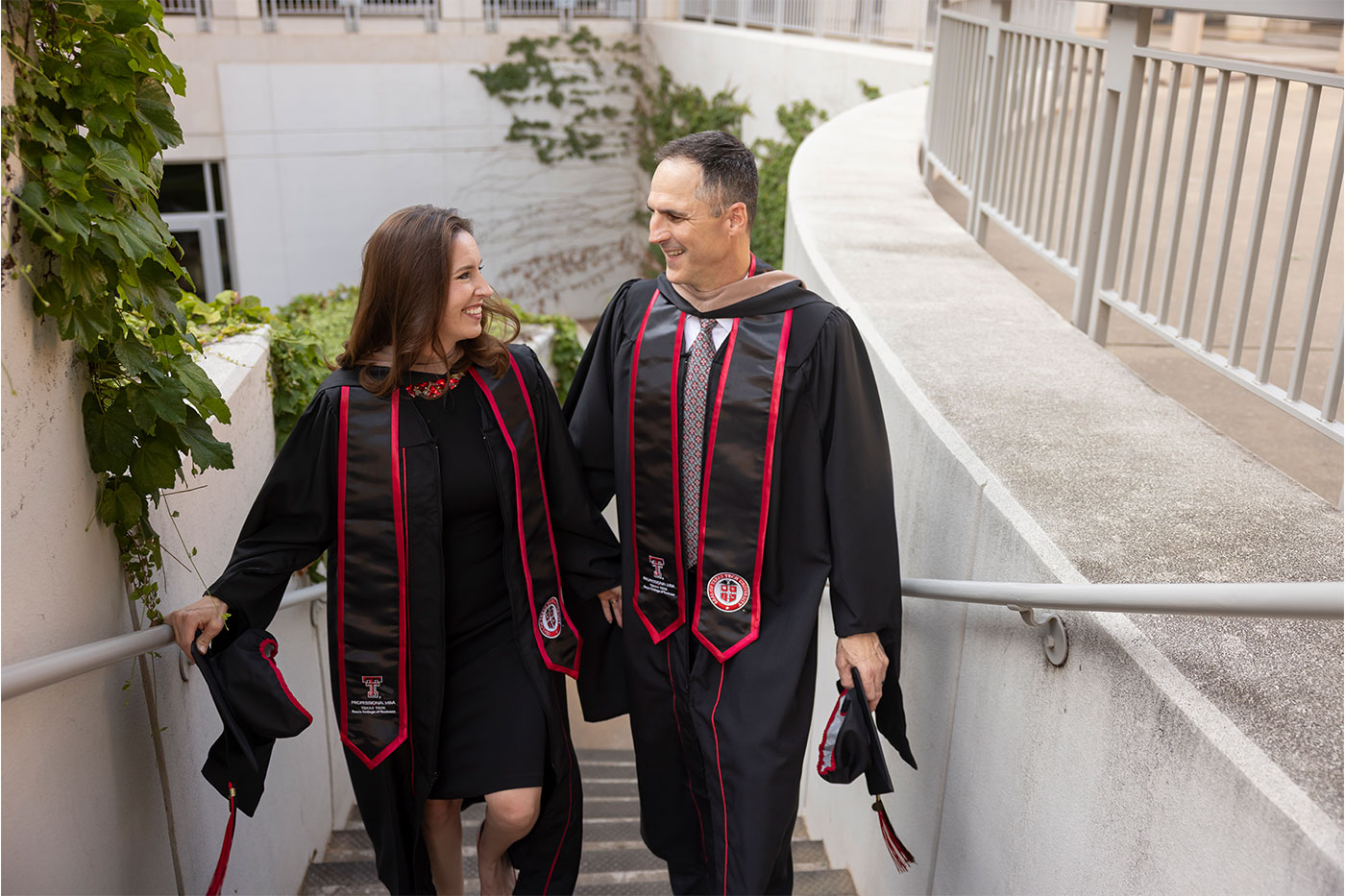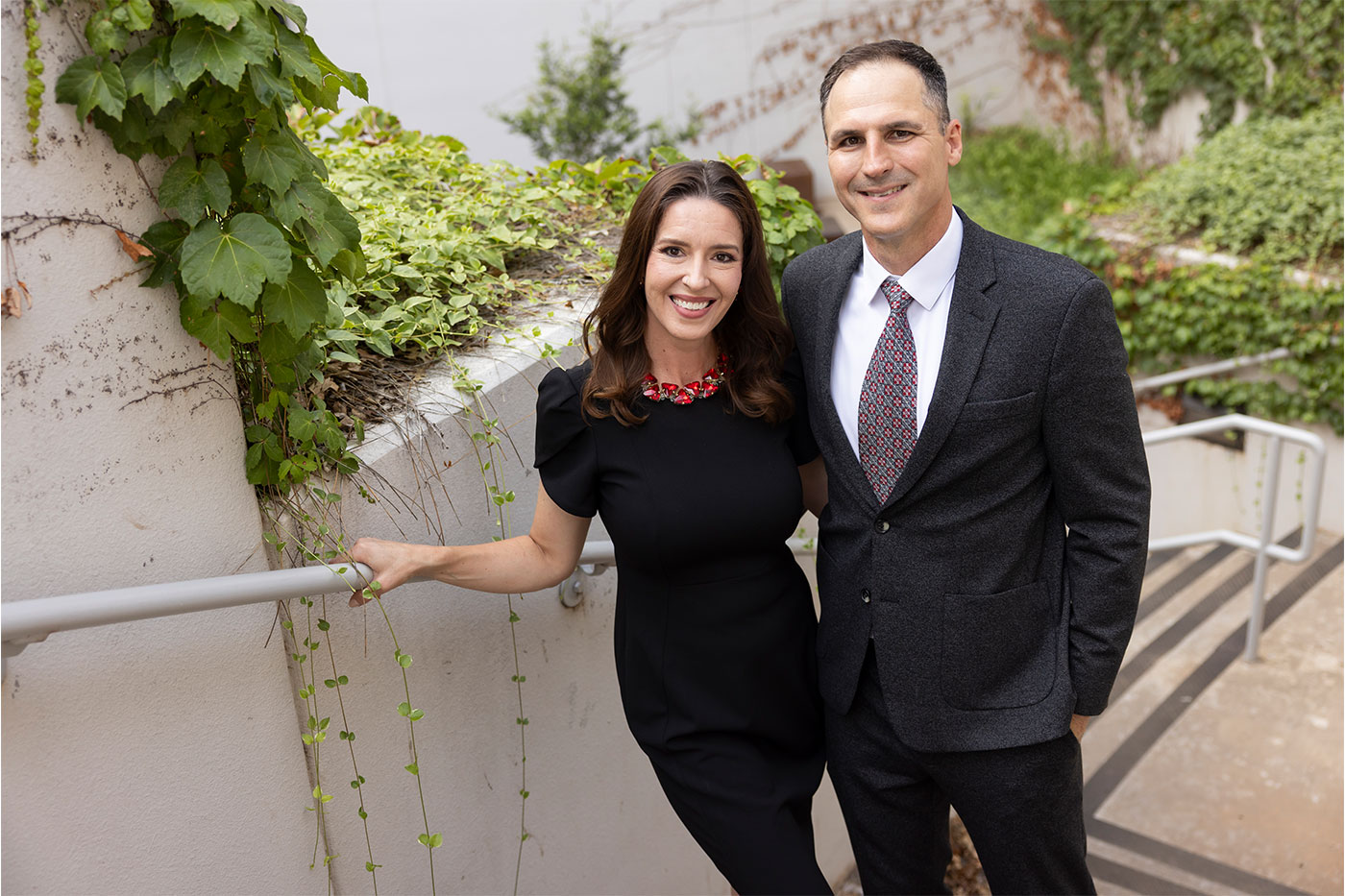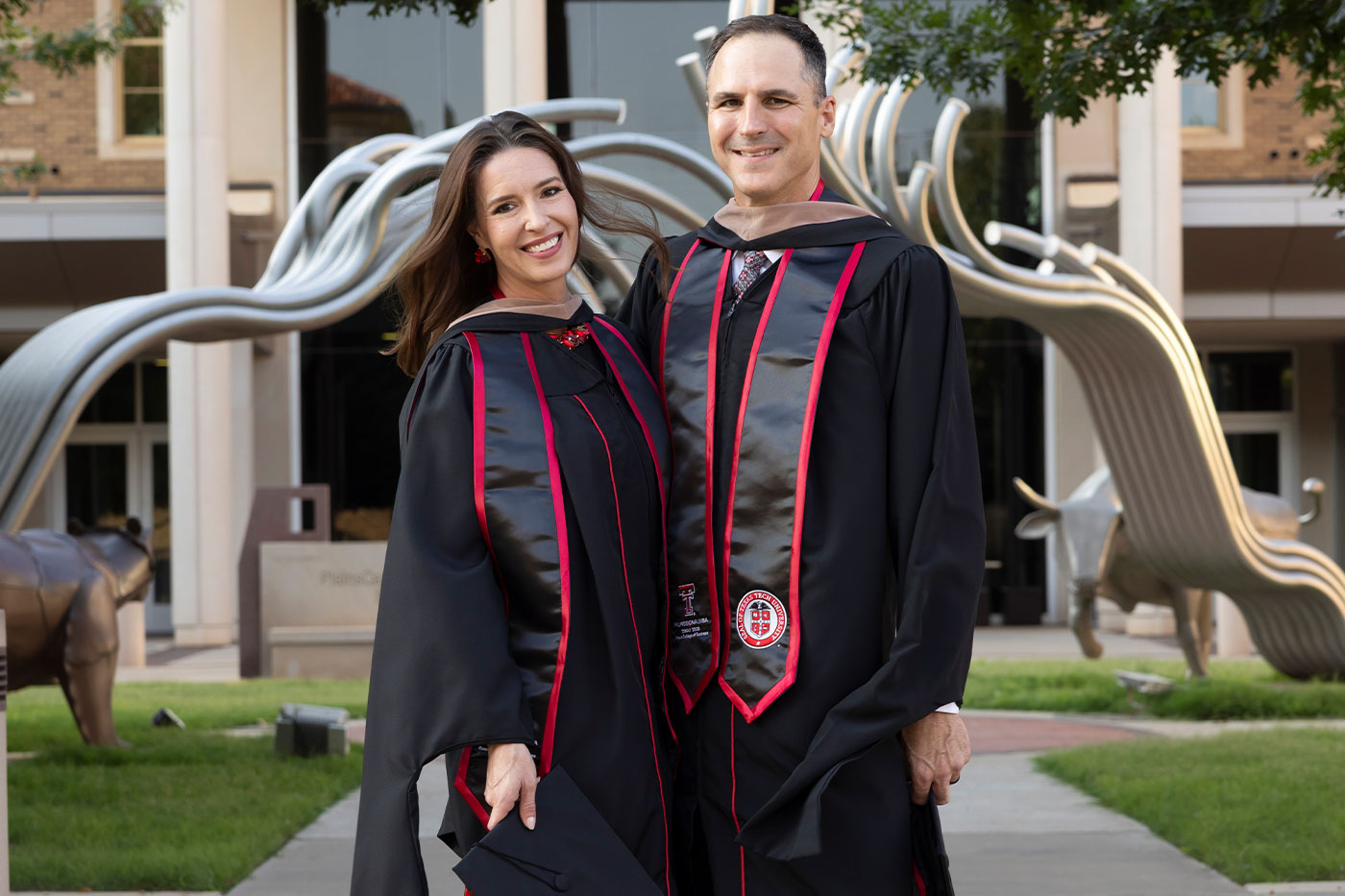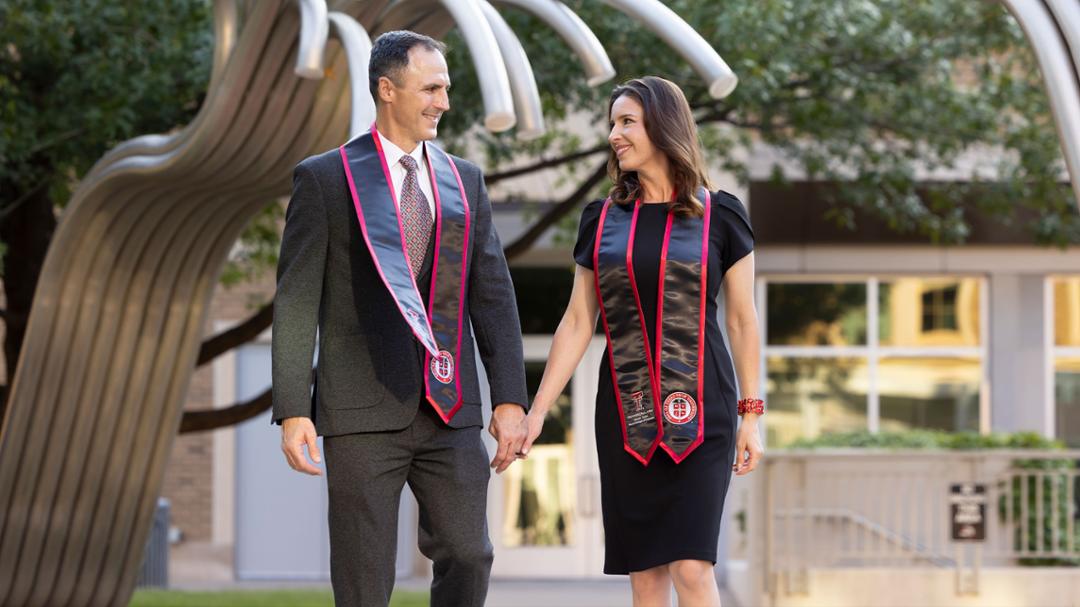The Winns are set to graduate this August and hope to inspire their children to become lifelong learners.
The Winns – Amy-Rose King and Russell – consider themselves a dynamic duo. It is not so much a humble brag as it is a distillation of their frame of mind. To the Winns, teamwork is their superpower.
It is a superpower that helped them raise five kids, currently ranging ages 13 to 21.
And it is in part because of their superpower that they will cross the stage, one after another, at Texas Tech University’s Summer 2025 Commencement and receive their MBAs through the Graduate School and the Professional MBA (PMBA) Program at the Jerry S. Rawls College of Business.
“We like to do as much together as possible,” Russell said. “Being able to achieve this together and walk across the stage knowing we did it all in tandem is amazing.”
The PMBA program is designed for working professionals, especially those in the early or middle stages of their careers. As such, it is meant to appeal to a wide swath of backgrounds and complement various industries.
It was a perfect option for the Lubbock-based couple. They may have a lot in common and are often in sync (even finishing each other’s sentences), but their backgrounds and initial enthusiasm toward earning an MBA could not be more different.
Filling Gaps and Unlocking Opportunities
Amy-Rose earned her bachelor’s in nursing from Lubbock Christian University. After nearly two decades, she pivoted from being a labor and delivery nurse to working as a negotiation strategist, advising business executives and their employees to work through problems. She describes her role as a confidant or advisor.
A few years ago, Amy-Rose attended a program on negotiation through Harvard Law School and noticed most of the participants had their MBAs. She began looking into her options. Yes, her negotiation career was new, but she already saw a potential gap to fill.
It did not take her long to realize the PMBA program was the perfect fix.
“It was local and had negotiation as one of the courses that was offered,” she said. “It just kind of serendipitously worked together on my timeline.”
Russell attended Texas Tech in the mid-1990s and earned his bachelor’s degree in anthropology before completing a master’s degree in geochemistry in the early 2000s. For over 20 years, he has worked in the mining and concrete industry, specifically with aggregates and industrial minerals.
During the COVID-19 pandemic in 2020, Russell felt his career had plateaued but also believed earning his MBA was a distant dream. Unsurprisingly, parenting five kids of various ages takes a lot of energy and time. There were his professional commitments to consider, too; he could not put off work to attend a midday class during the week. Plus, being out of school for so long felt like a daunting hurdle to overcome.
The PMBA program became a viable option after discussing it with Amy-Rose. He appreciated the hybrid modality of the PMBA – students complete most work online but attend in-person classes one weekend per month. It also helped that there was a Lubbock-based offering.
“When Amy-Rose started looking into the program, that’s when I thought, ‘Oh, maybe we could both do it at the same time,’” Russell said about Amy-Rose’s impact on him working toward his MBA.

Still, while Amy-Rose was all in on the PMBA program, Russell viewed the first semester as a probationary period and jokingly likened himself to Neo from the movie “The Matrix” – someone returning to a familiar yet strange world. As Neo plugged back into the digital realm, Russell returned to the classroom.
It did not take long – not even that full first semester – for both Amy-Rose and Russell to feel confident about their decision to enroll in the PMBA program together and see this out to the very end.
Putting the Coursework to Work
The Winns wanted to make sure if they were paying for two tuitions that they were getting two unique experiences within the PMBA program. They set up some house rules, which came in handy as they were in the same courses throughout their time in the program.
They did their best to avoid being in the same group during in-class discussions or projects when at all possible. They did not want to influence the other’s learning experience or point of view.
They also refrained from talking about their group work with one another until a major deadline had passed or a project was submitted.
“We got to debrief each other after the fact,” Russell said. “‘Oh, my group was talking about this.’”
But during the projects, we kept it like, ‘I’m not telling you any secrets,’” Amy-Rose quickly and jokingly added. “It was really hard because we would want to talk about the projects, but we would wait until after they were turned in.”
Still, they allowed themselves to talk about key concepts as they went through their courses, and they found that the PMBA unlocked a new level in their daily communication.
Working in different industries, any work-related talk between Amy-Rose or Russell was often unidirectional. Sure, the partner outside of the industry would do their best to understand the other person, but conversations were slow, often requiring preambles that introduced people, concepts or scenarios.

Their time in the PMBA was different. It was a shared experience, and conversations about the challenging coursework did not need those slow lead-ins. The courses provided the knowledge and the foundation; the conversations around the house or at the dinner table gave them time to process the challenging material and discuss how to apply it in their professional worlds.
“We would come out of a lecture and one of us picked up on some key aspects while another picked up on different ones,” Russell said. “It was fun, always having somebody to compare and bounce ideas off of.”
“We got to chew on the material a lot together,” Amy-Rose added. “It expanded our learning a lot because we were constantly able to discuss everything and use it.”
Above all else –the hybrid modality, the flexible schedule, or the enthusiastic faculty and student body – Amy-Rose and Russell appreciated how quickly they could apply the course material to their respective work.
Amy-Rose created a new negotiation process that lets her tailor her work to her various clients better. She felt the PMBA program gave her a more complete understanding of the challenges and concerns facing different departments and functional teams within an organization.
“So much of negotiating is like working on a puzzle, so now I’ve got more pieces that I can plug into these puzzles,” she said. “It’s more effective. It’s more fun. The program has just completely blown the lid off what I was able to do.”
Russell has seen more quantifiable impacts on his career along with the growth of his soft skills. Since joining the PMBA program, Russell earned two promotions at work.
“I know that’s probably not going to be the case for everybody,” he said. “It’s a very singular thing where I’m at and with my employer, but it’s been cool. I can directly attribute that to the program and what I’ve been learning.”
Walking the Walk
Amy-Rose sees graduating as the culmination of finally taking control of her career. She studied nursing as an undergrad because that was what her family wanted for her, but getting into negotiation was her decision.
“Now, I’m choosing something that lights me up and is my calling in this world,” Amy-Rose proudly said. “It’s not just a career; it’s so much more.”
Russell may have jokingly compared himself to Neo from “The Matrix,” but he is proud of how he reinserted himself into a classroom and became a student again.
“At times, it was uncomfortable at this stage professionally to be like, ‘Oh, I still have a lot to learn,’” he said. “It’s humbling growth. I was learning and becoming better at this and applying it to work. That’s been the fun part for me.”

Amy-Rose and Russell hope the work they put into completing the PMBA program helps their children appreciate education. This is especially important to them considering one of their daughters is currently paying her own way through her undergraduate program at Texas Tech. Amy-Rose and Russell hope their daughter has seen the sacrifices – financial, mental, social and so much more – they have made to get to this point.
Even more so, they want to pass on the importance of a lifelong learning mindset to all of their children.
“We want to show them what happens in 20 years if they change their mind about what they want to do in life,” Amy-Rose said. “You can do it. It’s just a new chapter of life.”
“I’m hoping they get to see through our actions that being a lifelong learner is something that they’ll want to continue doing,” Russell added. “Whether they go to university or not. Just continue learning and trying to do well.”
But it is as a testament to themselves as a married couple and their teamwork superpower where Amy-Rose and Russell feel the proudest about graduating.
“Sometimes people outgrow each other in life,” Amy-Rose said. “We try to do things that grow us together.”

